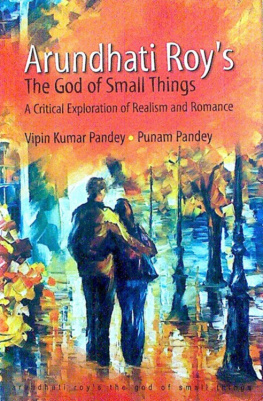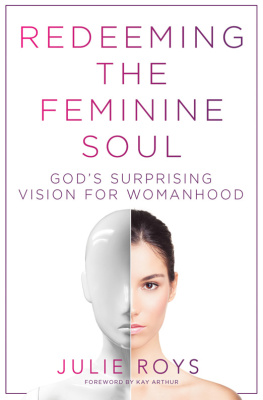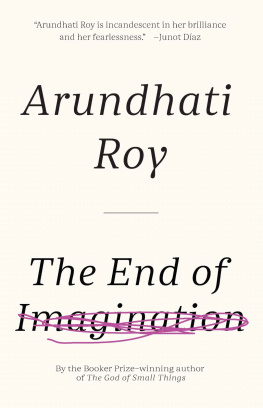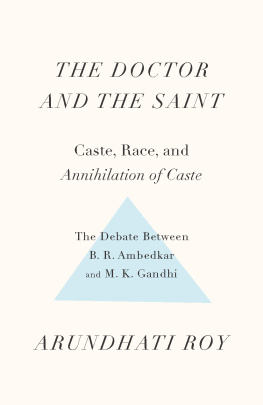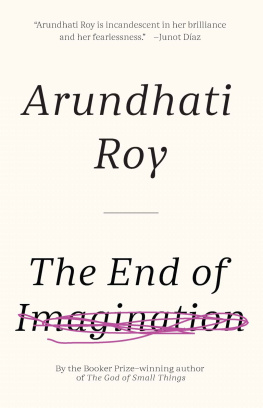Bibliography
Bhabha, Homi. 1994. (ed.) Nation and Narration. London: Routledge.
Bhatt, Indira. Victims and Victimizers: A Study of Arundhati Roys The God of Small Things. Explorations : Arundhati Roys the God of Small things.(ed.) Indira Bhatt and Indira Nityanandam. Creative New Literature Series- 27. New Delhi: Creative Books, 1999: 136-41.
Bryso, Valerie. 1992. Feminist Political Theory: An Introduction. London: Macmillan.
Bunting, Madeline Dambuster. 2001.The Guardian Weekend, July 28.
Chatterjee, Partha. 1986. Nationalist Thought and the Colonial World: A Derivative Discourse? Delhi: Oxford UP.
Dhawan, R.K. 1999. (ed.) Arundhati Roy: the Novelist Extraordinary. New Delhi: Prestige.
Dickinson, Emily. Because I could not Stop for Death. American literature 1890-1965: An Anthology, (ed.) Egbert S. Oliver. New Delhi: Eurasia Pubhshing House, 1984: 332.
Dodiya, Jaydipsinh. 1999. Arundhati Roy: The Woman and the Writer. The Critical Studies of Arundhati Roys The God of Small Things, (ed.) Jaydipsinh Dodiya and Joya Chakravarty. New Delhi: Stantic Publishers: 1-7.
Forster, E.M. 1935. Preface. Untouchable, by Mulk Raj Anand. New Delhi: Arnold Associates: 7-10.
George, C.J. Mulk Raj Anand His Art and Concerns: A Study of His Non-autobiographical Novels. New Delhi: Atlantic Publishers, 1994. Ghatak, Maitreya. 1997. Introduction. Dust on th Road: The Activist Writings ofMahasweta Dewf.Calcutta: Seagull Books:
Gilbert, M. Santra, and Susan Gubar, 1985. (eds.) The Norton Anthology of Literature by Women: The Traditions in English. (2nd edn.) New York: Norton.
Guha, Ranajit. 1982. (ed.) Subaltern Studies: Writings on South Asian History and Society, Vol. 1, Delhi: Oxford U.
Mahadevan, Usha. 2003. Arundhati Roys The God of Small things: A Narrative Response. The Indice View: Native Responses to Contemporary Indian English Novel, (ed.) Rangrao Bhongle. New Delhi: Atlantic Publishers, 83-94.
Mandal, Somdatta. 1999. From Periphery to the Mainstream: The Making, Marketing and Media Response to Arundhati Roy. Arundhati Roy: The Novelist Extraordinary, (ed.) R.K. Dhawan. New Delhi: Prestige, 23-37.
Mani, K. Ratna Shiela. 1999. Arundhati Roys The God of Small Things: A Study in Point of View. The Critical Studies of Arundhati Roys The God of Small Things, (ed.) Jaydipsnh Dodiya and Joya Chakravary. New Delhi: Atlantic Publishers: 8-21.
Morrison, Toni. 1978. Songs of Soloman. New York: Signet.
Pathak. R.S., (ed.) The Fictional World of Arundhati Roy.
Creative New Literatre Series-48. New Delhi: Creative Books, 2001: 9-28
Roy, Arundhati. 1997. The God of Small Things. New Delhi: India Ink Publishing Co. Pvt. Ltd.
Roy, Arundhati. 1999. The Novelist Extraordinary, (ed.) R.K. Dhawan. New Delhi: Prestige: 406-18
Bhatt, Indira and Indira Nityanandam. 1999. Roys The God of Small Things, (ed.) Creative New Literature Series-27. New Delhi: Creative Books: 130-35.
Said, Edward. Orientalism. New York: Pantheon, 1978.
Sartere, Jean Paul. 1990. Preface. The Wretched of the Earth. By Frantz Fanon. London: Penguin: 7-26
Shakespeare, William. The Tempest. Calicut: Calicut University, 1997.
Sharma, R.S. and Sashi Bala Talwar. Arundhait roys The God of Small Things: Critique and Commentary. Creative New Literature, Series-25. New Delhi: Creative Books, 1998.
Showalter, Elaine. 1982. A Literature of Their Own: British Women Novelists from Bronte to Lessing. U.K: Virago Press.
Usmai, Meena. Oct., 16, 2000. Violence Against Women in University News, Magazine. New Delhi. Vol. 38, No. 42.
Vivekanand, Swami. 1983. Caste, Culture and Socialism. Culcutta: Ashutosh Lithographic Co.
Anand, Mulk Raj and Eleanor Zelliot. 1992. An Anthology of Dalit Literature. New delhi: Gyan Publishing House.
Dalit Autobiography& Dalit Literature. Delhi: Gautam Book Centre, Hardevpuri, Shahadra.
Das, K.C. 2004. Indian Dalit : Voices, Visions and Politics. Delhi: Global Vision.
Dutta, K. B. 2005. Dynamic of Dalit: Old Issues and New Challenges. New Delhi: Akansha.
Goldberg,DavidTheo. 1993. Racist Culture: Philosophy and Politics of Meaning. Cambridge: Blackwell.
Hazari. Untouchable: 1970. The Autobiographyof An Indian Outcaste. New York: Krieger Publishers.
Keer,dhananjay. Mahatma Jotirao Phoolay: 1964. Father of Our Social Revolution. Bombay.
Kuber,W. N .Ambedkar: A Critical Study . Delhi: Gautam Book Centre, Hardevpura, Shahadra.
Rajawat,Mamta. 2008. Historyof Dalit. New Delhi: Yash publication.
Introduction
One of the glittering stars in the firmament of Indian fiction in English Arundhati Roy secured a very prestigious position not only in India but abroad also by dint of her excellence in art. She brought laurels to the country by winning the coveted Booker Prize in 1997 when India celebrated her 50th anniversary of independence. Roy has been first Indian woman who won this prize for her creations. She was born in Shillong in 1961 in Meghalaya to a Keralite Syrian Christian mother and a Bengali Hindu father, a tea planter by profession. Her mother, Mary Roy was well known social activist. Their conjugal lives were unhealthy and affected Roy badly. She said in an interview with Sunday Plus, I dont want to discuss my father. I dont know him at all. Ive only seen him a couple of times, thats it. Her mother was divorced. Roy spent a large part of her childhood in Ayemenem, a small town near Kottayam in Kerala, schooling in Corpus Christi. She left Kerla for Delhi at age of 16, and embarked on a homeless life style, staying in a small hut with the tin roof with in the walls of Delhi Feroz Shah Kotla. She proceeded to study architecture at Delhi School of Architecture; she is an omniscient writer and critic. She is master of style and technique. In an interview with India Today, Roy puts up things which throw much light on her determination and objectives of life:
For practical reasons, I was terrified of place where I grew up, I knew I had to get away. I had to be economically independent; thats the only way you can save your mind in India as a woman. The only thing that mattered to me was earning my own living at all costs. I knew I had to do a professional course, I was good at drawing and hopeless at math and in my second year of college I was asked to leave home. (Newsweek, June 23, 1997:60)
Arundhati Roy was awarded the Booker Prize for The God of Small Things in 1997. She won the National Film Award for best screenplay in 1989, for the screenplay of in which Annie Gives it Those Ones. In 2002, she won the Lannan foundations cultural freedom for her works about civil societies that are adversely affected the worlds most powerful government and corporation, in order to celebrate her life and her ongoing works in the struggle for Justice and Cultural diversity. Roy was awarded the Sydney Peace Prize in May 2004 for work in social campaigns and her advocacy of non-violence.
In January 2006, she was awarded the Sahitya Akademi Award, a national award from Indias Accedemy of Letters, for her collection of essays on contemporary issues in her The Algebra of Infinite Justice but she declined to accept it in protest against the Indian government being violently and ruthlessly pursuing policies of brutalization of industrial workers increasing militarization and economic neo-liberalization.
Arundhati Roy as an Indian English writer penetrates contemporary social-political issues which is amply perceptible in a number of articles, interviews and books. Various topics caught her attention like exploitation and oppression of deserted and woman corrupted system discriminatory attitude of the police and many social, political, psychological issues are well accommodated in her attempts and works. There is a nice blending of fact and fiction. In her praise Indira Nityanandan expresses a bit of her mind:
Next page
